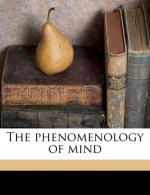
|
| Name: _________________________ | Period: ___________________ |
This quiz consists of 5 multiple choice and 5 short answer questions through Observation of the Relation of Self-Consciousness to Its Immediate Actuality- Physiognomy and Phrenology.
Multiple Choice Questions
1. In Hegel's terminology, what does the term "sensibility" pertain to?
(a) A zeitgeist, a spirit of the times.
(b) A physiological apparatus for perception.
(c) An entity whose end is itself.
(d) A mental construct that organizes sensations.
2. What is the relationship between phrenology, physiognomy, and cranioscopy according to Hegel?
(a) They are all evidence of different kinds of scientific thinking.
(b) They all address the problem of embodiment of self-consciousness.
(c) They all represent sciences that have evolved closer to conciousness.
(d) They are all forms of self-measurement and self-reflection.
3. How does Hegel classify desires?
(a) Demonic consciousness.
(b) Animal consciousness.
(c) The root of self-awareness.
(d) Material existence.
4. What is it that expresses both the individual and inner reality, in Hegel's view?
(a) Physical form.
(b) Action.
(c) Self-reflection.
(d) Conflict within the self.
5. What did cranioscopy examine?
(a) The form of the skull.
(b) The density of the skull.
(c) The evolution of the human skull.
(d) The simliarity of skull shapes within families.
Short Answer Questions
1. How does Hegel define "irritability"?
2. According to Hegel, how does the animal fulfill its purpose?
3. How does Hegel describe reason?
4. What were both phrenology and cranioscopy looking for?
5. According to Hegel, how does the truth of concrete individuals manifest?
|
This section contains 284 words (approx. 1 page at 300 words per page) |

|




